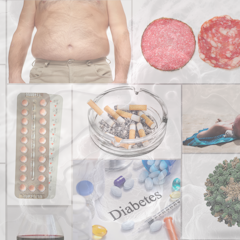
Articles on Colon cancer
Displaying all articles

Colon cancer is curable when caught early, but some insurers are either refusing to cover or significantly delaying approval for colonoscopies.

Taking care of your smile could prevent disease elsewhere in the body.

This bacterium has been linked to conditions such as IBS and colon cancer.

Fibre isn’t just associated with colon health; it’s associated with overall health and brain health through the gut-brain axis. But not all fibres are created equal.

There is no one-size-fits-all approach to treating cancer. Understanding how cancer cells evolve could help researchers develop more effective drugs.

Middle age means staying a step ahead on both the medical and financial fronts.

Don’t be confused by recent media reports – colonoscopies are still the best way to detect and prevent colon cancer.

Overcoming the access barriers and biases that underrepresented and underserved communities face could not only improve research participation but also improve care.

Screening for colorectal cancer should begin at 45, not 50. A colorectal cancer expert explains how that could save lives, and why the age was lowered.

A really important symptom to look out for is new rectal bleeding when you pass a bowel movement. But anyone can buy a home testing kit if they’re concerned.

Colorectal cancer rates among older adults have been declining, but diagnoses in adults younger than 50 have increased. As Colorectal Cancer Awareness Month winds down, a researcher offers insight.

It’s clear that socioeconomic position has a strong influence on cancer incidence and mortality in Australia.

Triclosan is found in thousands of personal care products from toothpaste to soap. New research links it to inflammation and cancer in the gut in mice, by disrupting their microbiome.

This body map brings together evidence on proven cancer causes. Using credible, scientific sources it answers questions about whether alcohol, red meat or sun exposure increase your cancer risk.

If you believe cancer is a disease that strikes from nowhere with little in your control to prevent it, you’d be mistaken on both counts. Most cases of cancer are considered preventable by positive nutrition…
Scientists from two universities have bioengineered a molecule that may help fight colon cancer. Human Alpha-lactabumin Made…
Mistletoe could potentially provide an alternative or complementary treatment to chemotherapy for colon cancer. Research…
